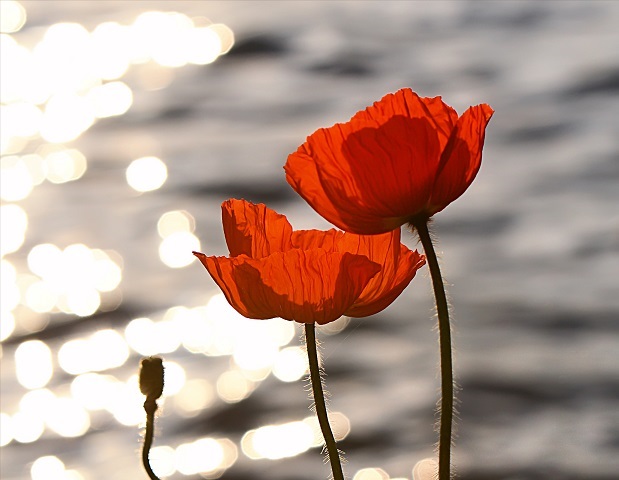
Poppies in the Sunset on Lake Geneva Photo (c) Eric Hill, taken from Wikipedia.
In Britten’s centenary year it was inevitable the War Requiem would feature heavily. This can be both a blessing and a curse, depending on your viewpoint. The former is certainly true for the sheer weight and quality of the music, and the powerful message Wilfred Owen’s war poetry delivers in tandem with the Requiem Mass. The latter applies because of the sheer number of performances of this amazing work, for it is true that too many concert experiences of the work can dilute the relevance of what Britten and Owen have to say.
This, though, was the ideal combination, a performance of the War Requiem on Remembrance Sunday, and the perfect opportunity to experience the work more as Britten would have liked; with the potential for reparation and reappraisal not just of his music but of his pacifist beliefs too. It is sad to say, but the War Requiem is destined never to be irrelevant in our world.
The lights in the Royal Albert Hall were respectfully dimmed throughout this performance, which began on a very sombre note with no need for further introduction. Indeed, the conductor Semyon Bychkov was careful not to invest even the fortissimo singing from the choir with too much volume initially, limiting the real explosions of noise to the massive perorations of the Dies irae, the Sanctus and the terrifying Libera me.
This approach magnified the emotional qualities of the quieter singing, and the acappella passages with which the Kyrie, Dies irae and Libera me end were especially poignant. You could hear a pin drop during each. Meanwhile the boys of the Westminster Abbey Choir, conducted by James O’Donnell, were positioned up in the gallery, at 3 o’clock to the stage – the ideal place from which the clarity of their contributions to the mass could be fully appreciated, an eerie counterpoint from on high.
The three vocal soloists gave excellent contributions. Soprano Sabina Cvilak disappeared into the sound of the choir at times, though this could well have been on account of where we were sat, relative to her position in front of the Royal Albert Hall organ. She dealt especially well with the lilting lines of the Lacrimosa.
The tenor Allan Clayton, a stand-in for Andrew Kennedy, clearly knows this music well. He achieved a beautifully pointed innocence in the yearning of Owen’s At a Calvary near the Ancre which dovetails with the Agnus Dei, its five to a bar never sounding more natural than it did here – especially when following on directly from the Sanctus. His ascent at the end, to the words ‘dona nobis pacem’, was serene.
The duets with Roderick Williams were extremely well handled by both singers. Time stood still during The Parable of the Old Man and the Young, Britten’s second setting of this Biblical test of Abraham and Isaac. It also came to a halt during the remarkable Strange Meeting, where the music was quietest of all, Clayton and Williams stripped to their emotional bare bones against a fragmented string quartet accompaniment. An equal sense of mental anguish could be found in The next war, and its opening words, ‘Out there we’ve walked quite friendly up to death’, with ghoulish accompaniment.
Williams’ baritone had a lovely, rounded sound, and while the two did not perhaps bring as much outright anger as some have to the Owen settings, the nightmarish horror of the poetry was always evident, thanks also to some superb playing from the chamber orchestra accompanying them.
The BBC Symphony Chorus and Crouch End Festival Chorus were superb, exceptionally well drilled and responding to Bychkov’s very subtle but well defined conducting, their ensemble bringing out the words with great clarity. There was fire and brimstone in the Dies irae, but the disorientating Libera me was the most powerful utterance, full of worrisome phrases as the music swirled in the face of the gathering storm. The BBC Symphony Orchestra were wonderfully responsive to all of this, heroes all.
At no point was this a spot lit performance, and great credit should go to Bychkov for attending to the text with great reverence, conducting with humility. Sometimes just a scoop of the hands was all that was needed. In this way attention was always focused on the text, and the assembled audience were left with much to ponder; surely the function of the War Requiem and Remembrance Sunday itself. To that end an immaculately observed, extended period of silence, the choir’s ‘Amen’ dying away to inaudibility, was the ideal way to respond.
This performance of Britten’s War Requiem can be heard on the BBC Radio 3 website until the evening of Sunday, 17 November.
